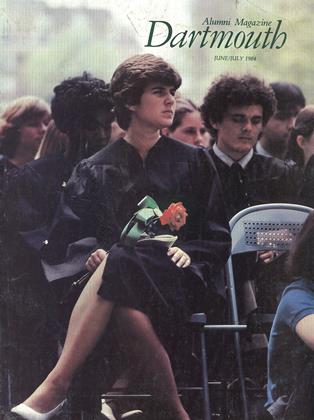Commencement is a bittersweet time a marker in one's experience that signifies new beginnings as well as the end of something. We hear that sort of talk a lot as graduation rolls around. This is because we are ritualistic creatures, we homo sapiens, locked routinely into the practice of marking the swift passage of time with anniversaries and birthdays, fairly well "into" the "Thank-God-it's-Friday" mentality, where the week is segmented into a series of symbolic phases. (Monday, the cartoonists inform us, is to be detested; Wednesday is "hump day," the point at which the weekend looms almost close enough to be tasted; and by midFriday, the Doppler effect is at work and before we have a chance to blink, the alarm clock announces another Monday morning.)
There's also a lot of banter around Commencement about those idyllic college days, and the other side of the coin euphemistically called the "real world." Dartmouth graduates are especially prone to this simplistic dichotomy because Main Street, Balch Hill, Moosilauke, and Union Village Dam lodge in the memory and have a way of lingering there. As George O'Connell noted in these pages last fall in "The Dartmouth Disease," one major factor in Big Greenerism is the place itself. Harold Bond '42 comes to a similar conclusion in his Class Day Oration (see pages 24-27 in this issue), closing with lyrical images from "Dartmouth Undying," the song which, for many of us, is the Dartmouth signature. (It may be heretical, but there's something more appealing to me about a College "miraculously builded" in our hearts than one somewhat awkwardly embraced for the granite in our muscles and our brains.)
It seems inescapable-memories of this place-especially when you're on your way out of Hanover for a spell-down to graduate school in Boston, New Haven, Palo Alto, or Charlottesville-into the corridors of Merrill Lynch, IBM, the SEC, in the Big Apple, or D.C.-often on roads less traveled by in out-of-the-way hamlets in Maine, Idaho, or Peru. But memory has a way of playing tricks on us; while we were there, the real world was Dartmouth. It was examinations, research papers and critical essays, class recitations and more formal presentations. It was the building of friend- ships in dormitories, fraternities, sororities, and clubs, friendships which changed as we grew into them. It was, in short, the world we lived. To reduce it to the way Dartmouth Row looks when a bonfire is flickering across its white bricks is one thing, but the suggestion that the "real world" begins after Dartmouth is to annihilate four very precious years of living.
 View Full Issue
View Full Issue
More From This Issue
-
 Feature
FeatureProfessor John Stearns '16: Rara Avis Una
June | July 1984 By Eddie Chamberlain '36 -
 Feature
FeatureCreativity: The Open Dance at Dartmouth
June | July 1984 By Prof. Blanche Gelfant -
 Feature
FeatureWearers of the Green
June | July 1984 By Jim Kenyon -
 Feature
FeatureThe Best Part of My Academic Life Here
June | July 1984 -
 Feature
FeatureMaking it Happen
June | July 1984 By Peggy Sadler -
 Feature
FeatureThe Quiet Good Man
June | July 1984 By Young Dawkins '72
Douglas Greenwood
-
 Lettter from the Editor
Lettter from the EditorVisions and Revisions
SEPTEMBER 1983 By Douglas Greenwood -
 Lettter from the Editor
Lettter from the Editor75 and Counting
OCTOBER, 1908 By Douglas Greenwood -
 Lettter from the Editor
Lettter from the EditorRuffly Speaking
NOVEMBER 1984 By Douglas Greenwood -
 Lettter from the Editor
Lettter from the EditorBetween the Lines
DECEMBER 1984 By Douglas Greenwood -
 Article
ArticleFootnotes on an Annual Report
MAY 1985 By Douglas Greenwood -
 Lettter from the Editor
Lettter from the EditorYou Can't Go Home, etc.
OCTOBER 1985 By Douglas Greenwood
Lettter from the Editor
-
 Lettter from the Editor
Lettter from the EditorEditorial Comment
AUGUST 1930 -
 Lettter from the Editor
Lettter from the EditorEditorial Comment
December 1932 -
 Lettter from the Editor
Lettter from the EditorA Freshman Writes Home
October 1940 -
 Lettter from the Editor
Lettter from the EditorSettling in in Hanover
JUNE 1983 By Douglas Greenwood -
 Lettter from the Editor
Lettter from the EditorThe Numbers Game
JANUARY/FEBRUARY 1985 By Douglas Greenwood -
 Lettter from the Editor
Lettter from the EditorA Magazine Makeover
Sept/Oct 2000 By Sean Plottner

